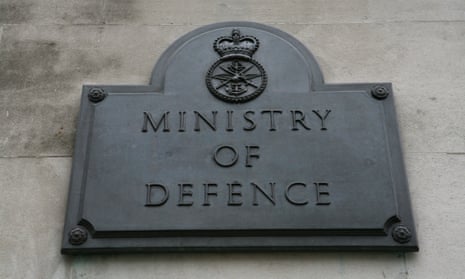The UK government has been accused of complicity in human rights abuses in Sudan, because it provides military support and training.
In the high court in London on Wednesday, Ali Agab Nour, a Sudanese human rights lawyer who fled the country and is now a refugee in the UK, is challenging the government’s actions.
Nour, 47, claims that the decision-making process that led to the provision of military support was unlawful and in breach of the government’s overseas security and justice assistance policy, which lays down certain criteria that must be met before military assistance can be provided.
The Ministry of Defence (MoD) insists that risk assessments were carried out correctly before military training and support was provided to Sudan.
Nour said: “I believe that any assistance to the [Sudanese] military that strengthens their capacity will allow them to commit more human rights abuses. It is a twisted logic that by giving advanced knowledge and training to the perpetrators of human rights abuses in Sudan, you protect human rights there.”
The Sudanese armed forces stand accused of a variety of human rights abuses including mass rape, ethnic cleansing and indiscriminate aerial bombardment. Regions in Sudan where human rights abuses have been documented include Darfur, Blue Nile, the Nuba mountains and South Kordofan.
The UK government has spent £2.2m in the last three years on a programme called Defence Engagement Sudan. It has provided “bespoke interventions” – defence training and English-language training – to Sudanese forces.
The UK is alone among western governments in providing this kind of military assistance to Sudan, a country with one of the worst human rights records in the world. The only other country offering this kind of support to Sudan is Iran.
The human rights organisation Enough, which has worked closely with the Hollywood actor George Clooney, monitors abuses in Sudan and condemned the UK government for providing military support to Sudanese forces.
“The British government is complicit in enabling the troops’ abuses to continue unabated. These courses are not restricted to lessons in the laws of war. Instead they cover things like campaign planning and execution, which in the context of Sudan means scorched earth, village burning and mass rape,” said Akshaya Kumar, Sudan and South Sudan policy analyst at Enough.
She said they had received confirmation from human rights organisations on the ground that more than 3,000 villages in Darfur had been burned, and monitors in the Nuba mountains had counted hundreds of bombs.
Much of the training provided by the MoD has taken place in Sudan, but some has been carried out in the UK, at the elite military college Sandhurst and the Royal College of Defence Studies.
Courses provided by the UK include conduct of military operations, campaign planning and execution, generating and managing combat power, training in military skills, weapons handling and battlefield disciplines of soldiering.
While the MoD acknowledges the human rights concerns about Sudan, it insists that its military training programme does not provide equipment, training or advice that could “directly lead to the Sudanese armed forces” having the ability “to conduct lethal operations”.
In a freedom of information response in July 2013 the MoD said its training “promotes stability, accountability, good governance, professional leadership and improved respect for human rights. However, we have no visibility of how this impacts on military behaviour in Darfur.”
Daniel Carey, of Deighton Pierce Glynn,one of the solicitors challenging the government, said: “Despite its appalling human rights record, the British government has repeatedly approved combat-related training to the Sudanese army. There is a worrying risk that the British government has been, and will be, complicit in appalling human rights abuses unless the government faithfully follows its own policy.”
In March the Independent Commission for Aid Impact issued a report questioning whether UK aid spent training overseas police forces may be making bad human rights situations even worse.
In Sudan more than £850,000 was spent on a police training programme that had to be terminated ahead of schedule following violent suppression of protests in Khartoum and other cities in September 2013, in which more than 100 unarmed democracy protesters were killed. The Sudanese army has been implicated in the mass rape of 221 women and girls in Tabit, in north Darfur, in October 2014.
Tuesday’s high court challenge was bought following a Guardian investigation in 2013, which revealed that the government was providing military training in Sudan.
The case continues.

Comments (…)
Sign in or create your Guardian account to join the discussion